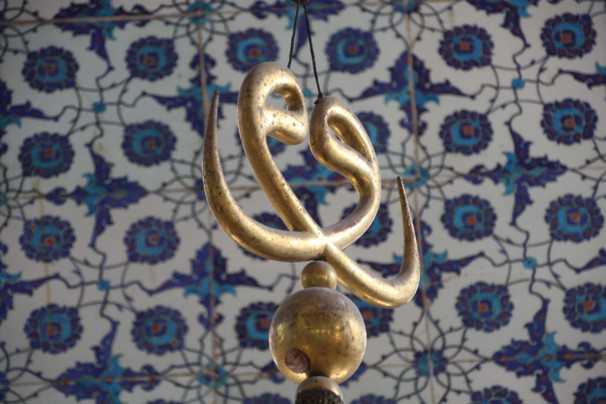Photo by Vern Yip – Inside the Topkapi Palace, a gold ornament hangs with famous blue Iznik tile in the background. Turkey is a culture rich with craftsmanship and influences from all parts of the world.

By Daniel Dombey and Funja Guler | Financial Times, Published: April 24
ISTANBUL — Sitting in his tiny shop in the heart of Istanbul’s Grand Bazaar, Mehmet Ali Yildirimturk explains why, despite the fall in gold prices this year, Turkey remains fascinated with the metal.
“In Turkey, when a baby is born, you give gold. When a circumcision takes place, you give gold. At weddings you give gold,” Yildirimturk said as a longtime customer squeezed into the wood-paneled shop for a valuation of her bracelet.
“People give gold as a way of providing economic support,” he added. “It is more gentle than giving money.”
Yildirimturk, who has run his shop for 50 years, estimates there are 150 other gold merchants under the bazaar’s Ottoman-era arches. Just a few yards away, gold traders bark orders on their cellphones.
But despite their place at the center of the country’s culture, Turkey’s gold merchants have particular reason to be discontented, over and above the metal’s steepest price decline in three decades. They are trying to fend off an attempt by the government to use the country’s hefty stock of gold savings to boost growth.
According to Turkey’s central bank, the population holds at least $115 billion, and perhaps much more, under its collective mattress. And since Turkey has big investment needs, little long-term capital from abroad and a low savings rate, the state is trying to move the nation’s store of gold from under the bed to a more formal place in the economy — preferably banks, where it can be used as reserves or collateral.
To the ire of Turkey’s legion of gold merchants, the banks have started to sell gold as well as buying it, trading not just bullion bars, but also the gold coins at the heart of Turkish culture.
“They are trying to take the bread out of our mouths,” said Alaatin Kameroglu, chairman of the Istanbul Chamber of Jewelry, whose organization has sued both the bank regulator and the post office, which has also started trading gold, for unfair competition. “Banks should concentrate on banking and leave gold to us.”
Events in Tehran and Washington have put additional pressure on the Turkish gold trade. Last year, as U.S. sanctions kicked in on banking transactions with Iran, the Islamic Republic stepped up gold purchases in Turkey, shipping the metal back — often via the United Arab Emirates — as an alternative way of getting capital into the country.
The effect on Turkey’s economy was dramatic: In a $10 billion swing in trade, Ankara shifted from being a net gold importer in 2011 to a net exporter in 2012. In some months, Turkey’s gold exports to the UAE alone almost reached $2 billion.
But now this business, too, has caught Washington’s attention and has been singled out for sanctions. In February, the most recent month for which figures are available, Turkey’s total exports of gold were worth $550 million, far below last year’s average of $1.1 billion a month — although they were still almost wholly accounted for by sales to the UAE and Iran.
That drop in demand is likely to contribute to a rise in Turkey’s current account deficit this year, after a decline last year, and increases the woes of the country’s gold trade at a time when it is beset by other problems.
Merchants in the bazaar cite the difficulties of doing business with Iran, adding that to do so requires frequent changes of name to avoid appearing on a U.S. blacklist. No one admits to selling to Iranians, who purchase gold bars rather than the stamped coins favored by Turks. At one store identified by competitors as being involved in the business, staff members refused to answer questions.
But back in his tiny shop, Yildirimturk tries to emphasize the rosy side of the recent upheavals, remembering doing business with emigres from Iran in the 1980s, Bulgaria in the 1990s and Iraq in the 2000s.
“There is always some crisis and tension in the Middle East, and gold gives some certainty,” he said. “Now that prices have gone down, it’s a good chance to buy it back.”
— Financial Times
Guler reported from Ankara.
via Turkey’s traditional gold trade comes under pressure – The Washington Post.

Leave a Reply